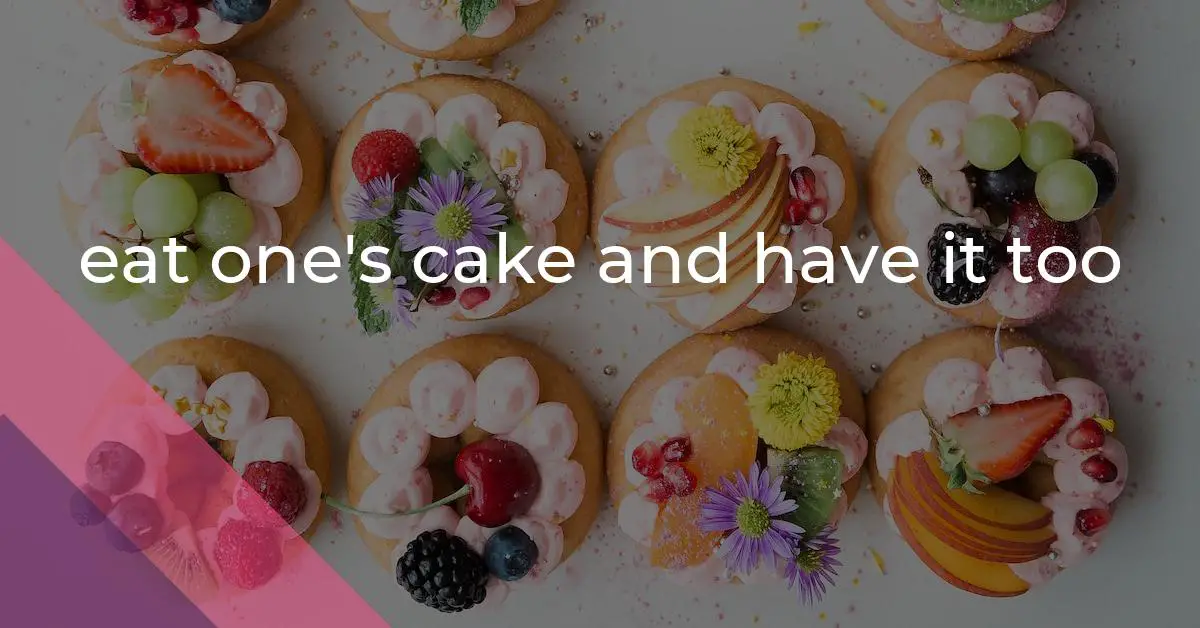eat one’s cake and have it too: Idiom Meaning and Origin
What does ‘eat one's cake and have it too’ mean?
The idiom "eat one's cake and have it too" means wanting to consume something or achieve a certain outcome, but also wanting to keep it intact or have it for future use. It implies a desire for contradictory things that cannot both be satisfied.

Idiom Explorer
The idiom "take the cake" means to be the most extreme or extraordinary in a negative way. It is used to express surprise, disappointment, or disapproval about something or someone's actions or behavior.
The idiom "have one's cake and eat it too" means wanting to have the benefits of two conflicting choices without making a sacrifice or compromise.
The idiom "eat one's feelings" means to cope with emotions or stress by indulging in comfort food or excessive eating, as a way of temporarily relieving emotional pain or distress.
The idiom "eat it" means to accept or tolerate something unpleasant or embarrassing, often with resignation or humility.
The idiom "eat for two" means to eat a large amount of food, often to the point of overeating or indulging excessively. It is a colloquial expression used to describe someone who has a hearty appetite or enjoys eating without restraint.
The idiom "eat crow" means to admit a mistake or defeat and accept the consequences, often with humility and embarrassment.
The idiom "eat an elephant one bite at a time" means tackling a large or overwhelming task by breaking it down into smaller, more manageable parts.
The idiom "eat and leave no crumbs" means to consume or use something completely without wasting or leaving any trace or evidence behind.
The idiom "eat, breathe, and sleep" means to be completely consumed or obsessed with something, to the point where it becomes an essential and constant part of one's life.
The idiom "eat one's young" means to destroy or harm the offspring or the next generation, either literally or figuratively, usually due to selfishness or lack of nurturing. It implies a lack of care or regard for the welfare of one's own children or future successors.
Elusive Dessert Dilemma
Eat one's cake and have it too is a common English idiom that has been in use for several centuries. It is often used to describe a situation in which someone wants to have the benefits or advantages of two conflicting options simultaneously. Despite its popularity and widespread usage, the exact origins of this idiom remain somewhat uncertain. However, it is believed to have originated in the 16th century and has since become a common phrase in everyday English language.
The meaning of this idiom can be inferred from its literal interpretation. It is essentially a paradoxical statement because having one's cake usually implies consuming or using it, which would make it impossible to still possess it. The idiom highlights the desire or unrealistic expectation of wanting to enjoy the benefits of both options without making a choice or facing any consequences.
The phrase "eat one's cake and have it too" is often used to express disappointment or frustration when someone's expectations or demands are unreasonable or contradictory. It implies a sense of entitlement or greediness, as the person wants to have everything without making any sacrifices or compromises.
This idiom is commonly used in various contexts, including personal relationships, business negotiations, and political discussions. It is often employed to criticize someone's unrealistic demands, highlighting the need to make difficult choices and prioritize one option over another.
While the origin of this idiom is not definitively known, some believe it can be traced back to early English proverbs and idioms. One similar phrase dating back to the 16th century is "to have a cake and eat it," which conveys a similar sentiment. Over time, the phrase evolved into its current form, "eat one's cake and have it too."
Despite the lack of concrete historical evidence, the idiom has become ingrained in the English language and continues to be widely used today. It is a phrase that resonates with people from various backgrounds and cultures because the desire to have it all without sacrificing anything is a universal theme.
The idiom "eat one's cake and have it too" represents the inherent human desire to want the best of both worlds without considering the limitations or consequences. It serves as a reminder that in life, we often have to make difficult choices and sacrifices in order to achieve our goals.
The related idiom "have one's cake and eat it too" conveys a similar sentiment. It means to want both options or benefits without having to make a choice or face any consequences. This idiom is often used interchangeably with "eat one's cake and have it too" and serves as a reinforcement of the underlying message.
Another related idiom is "butter one's bread on both sides." It is similar in meaning as it implies wanting to have the advantages of both options simultaneously. This idiom is often used to criticize someone's unrealistic expectations or demands, highlighting the need to make a choice and accept the consequences.
The idiom "eat one's feelings" is also somewhat related to "eat one's cake and have it too." It refers to the act of consuming food as a means of coping with emotional distress or stress. While it may not directly convey the idea of wanting to have it all, it does relate to the idea of seeking comfort or relief without addressing the underlying issues.
Lastly, the idiom "eat for two" is unrelated in meaning but shares the word "eat" in common with "eat one's cake and have it too." "Eat for two" means to eat excessively, usually in the context of pregnancy. This idiom has a literal interpretation and is not directly linked to the idea of wanting to have it all.
Example usage
Examples of how the idiom can be used in a sentence:
- You can't eat your cake and have it too, meaning you can't spend all your money on fancy clothes and then expect to have enough left for a vacation.
- In the debate, the politicians claimed they could reduce taxes and increase spending, but it's like trying to eat your cake and have it too - it just doesn't work.
- He wants to be in a committed relationship, but still wants the freedom to flirt and see other people. He's trying to eat his cake and have it too.
More "Contradictions" idioms



